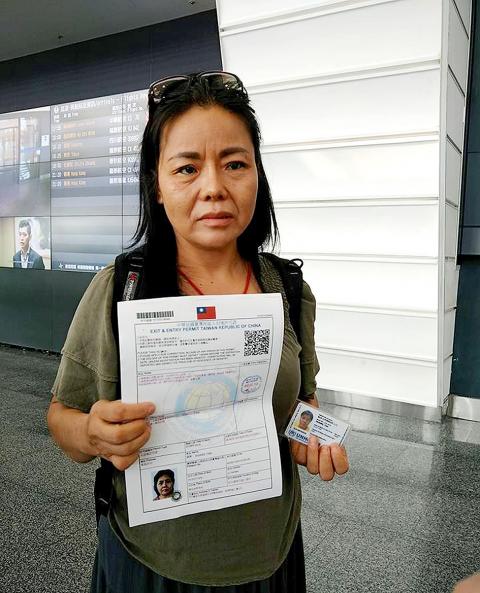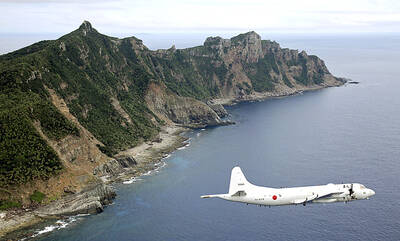The Ministry of Foreign Affairs yesterday said it would offer assistance to a Chinese human rights activist seeking political asylum who has been allowed into Taiwan for a three-month stay.
The Mainland Affairs Council late on Wednesday confirmed a report by online newspaper Hong Kong Free Press, which said that Huang Yan (黃燕), who has been granted refugee status by the UN, arrived at Taiwan Taoyuan International Airport at 8:40pm on Tuesday from Jakarta.
Huang has been subject to detentions, house arrest and brutality at the hands of state agents due to her involvement in campaigns demanding freedom for activists and lawyers detained in China, the newspaper said.

Photo courtesy of Taiwan Association for China Human Rights
Due to Taiwan’s lack of a refugee law, Huang had to remain at the airport and was facing deportation to China, where she faces persecution, until authorities decided to grant her temporary protection, the newspaper said.
Council spokesman Chiu Chui-cheng (邱垂正) confirmed the report, saying that the government approved Huang’s stay due to considerations that she could face persecution if returned to China.
The National Immigration Agency’s joint review committee examined her case and, taking into account her UN status as a refugee and the danger she could face in China, granted her a three-month stay, Chiu said.
Once the temporary stay period concludes, Huang would have to resettle in another nation, he added.
Asked to comment on Taiwan Association for China Human Rights chairman Yang Hsien-hung’s (楊憲宏) suggestion that the government report Huang’s location to the UN, ministry spokesman Andrew Lee (李憲章) told a morning news conference that Huang’s entry into Taiwan is a matter overseen by the agency, while the council is responsible for affairs related to Chinese citizens.
“That said, should [Huang] require the assistance of the ministry or our overseas representative offices in the future, we will provide it accordingly,” Lee said, adding that the ministry has yet to receive such a request.
The case came amid tension across the Taiwan Strait that has continued to rise following Beijing’s continued efforts to poach Taiwan’s diplomatic allies and limit the nation’s international presence.
Burkina Faso on Thursday last week became the fourth nation since President Tsai Ing-wen (蔡英文) took office in May 2016 to sever ties with Taiwan — likely due to financial incentives from China — after Sao Tome and Principe in December 2016, Panama in June last year and the Dominican Republic last month.
China has also blocked Taiwan from receiving an invitation to the World Health Assembly for two consecutive years.
As a countermeasure, the council announced that it would tighten its screening of applications by Chinese officials to visit Taiwan.
Additional reporting by staff writer

MISINFORMATION: The generated content tends to adopt China’s official stance, such as ‘Taiwan is currently governed by the Chinese central government,’ the NSB said Five China-developed artificial intelligence (AI) language models exhibit cybersecurity risks and content biases, an inspection conducted by the National Security Bureau (NSB) showed. The five AI tools are: DeepSeek, Doubao (豆包), Yiyan (文心一言), Tongyi (通義千問) and Yuanbao (騰訊元寶), the bureau said, advising people to remain vigilant to protect personal data privacy and corporate business secrets. The NSB said it, in accordance with the National Intelligence Services Act (國家情報工作法), has reviewed international cybersecurity reports and intelligence, and coordinated with the Ministry of Justice Investigation Bureau and the National Police Agency’s Criminal Investigation Bureau to conduct an inspection of China-made AI language

LIMITS: While China increases military pressure on Taiwan and expands its use of cognitive warfare, it is unwilling to target tech supply chains, the report said US and Taiwan military officials have warned that the Chinese People’s Liberation Army (PLA) could implement a blockade within “a matter of hours” and need only “minimal conversion time” prior to an attack on Taiwan, a report released on Tuesday by the US Senate’s China Economic and Security Review Commission said. “While there is no indication that China is planning an imminent attack, the United States and its allies and partners can no longer assume that a Taiwan contingency is a distant possibility for which they would have ample time to prepare,” it said. The commission made the comments in its annual

‘TROUBLEMAKER’: Most countries believe that it is China — rather than Taiwan — that is undermining regional peace and stability with its coercive tactics, the president said China should restrain itself and refrain from being a troublemaker that sabotages peace and stability in the Indo-Pacific region, President William Lai (賴清德) said yesterday. Lai made the remarks after China Coast Guard vessels sailed into disputed waters off the Senkaku Islands — known as the Diaoyutai Islands (釣魚台) in Taiwan — following a remark Japanese Prime Minister Sanae Takaichi made regarding Taiwan. Takaichi during a parliamentary session on Nov. 7 said that a “Taiwan contingency” involving a Chinese naval blockade could qualify as a “survival-threatening situation” for Japan, and trigger Tokyo’s deployment of its military for defense. Asked about the escalating tensions

DISPUTE: A Chinese official prompted a formal protest from Tokyo by saying that ‘the dirty head that sticks itself out must be cut off,’ after Takaichi’s Taiwan remarks Four armed China Coast Guard vessels yesterday morning sailed through disputed waters controlled by Japan, amid a diplomatic spat following Japanese Prime Minister Sanae Takaichi’s comments on Taiwan. The four ships sailed around the Senkaku Islands — known as the Diaoyutai Islands (釣魚台) to Taiwan, and which Taiwan and China also claim — on Saturday before entering Japanese waters yesterday and left, the Japan Coast Guard said. The China Coast Guard said in a statement that it carried out a “rights enforcement patrol” through the waters and that it was a lawful operation. As of the end of last month,